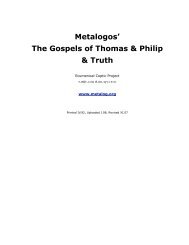Andrew Louth - Syriac Christian Church
Andrew Louth - Syriac Christian Church
Andrew Louth - Syriac Christian Church
You also want an ePaper? Increase the reach of your titles
YUMPU automatically turns print PDFs into web optimized ePapers that Google loves.
10 On Maximus’ understanding of human willing, see Gauthier (1954) and,<br />
particularly on the question of how far Maximus is indebted to any<br />
earlier thought, J.D.Madden in Heinzer and Schönborn (1982), 61–79.<br />
11 As Madden claims, op. cit., 79. This claim is presumably to be limited to<br />
the Greek tradition, as similar claims have been made for St Augustine<br />
in the West two centuries earlier (e.g., by Clark [1958]). The question of<br />
Maximus’ relation to the great Western doctor is intriguing. Maximus<br />
spent more than twenty years in the West, fifteen of them in North<br />
Africa, where theology was still under the sway of Augustine, yet he<br />
never cites Augustine. There are, nevertheless, several possible points<br />
of contact between the two doctors of the <strong>Church</strong>, of which this question<br />
of human willing is one. See Berthold (1982).<br />
12 Opusc. 26:277C and (in abbreviated form) 28:301C, taken more or less<br />
correctly from Diadochus of Photikê, Century on Spiritual Knowledge 5<br />
(des Places [1966], 86).<br />
13 Opusc. 26:276C. These definitions are not found in any of the works of<br />
Clement of Alexandria that have survived, and it may well be that they<br />
are really Maximus’ own definitions of will ascribed, by himself or a<br />
pupil, to a figure from antiquity (one of these definitions is used by<br />
Maximus in Opusc. 3, translated below, without any suggestion that he<br />
has taken it from Clement of Alexandria). The status of ‘Opusc. 26’ is<br />
quite unclear: it may consist of notes found in Maximus’ papers and<br />
preserved by a disciple. The last two definitions of will in Opusc. 26 are<br />
ascribed to ‘Saint’ Maximus, which strongly suggests that we are<br />
dealing here with a later compilation. On this whole question of<br />
definitions of will provided by Maximus, see J.D.Madden, op. cit., 61–79.<br />
5<br />
COSMIC THEOLOGY<br />
NOTES 201<br />
1 There is no need to give an elaborate bibliography, but there is a<br />
characteristically wide-ranging and thought-provoking article on what<br />
might be meant by a modern Orthodox cosmology by Olivier Clément in<br />
Clément (1967).<br />
2 Athanasius, De Incarnatione 7.<br />
3 Ibid.<br />
4 Tên eis to mê einai phthoran: De Incarnatione 4.<br />
5 It is instructive to contrast Athanasius’ treatment of why repentance on<br />
Adam’s part would have been insufficient with Anselm’s treatment of<br />
the same problem in Cur Deus homo I. 20. Athanasius also mentions the<br />
offence done to God’s honour, but the reason he gives for the inadequacy<br />
of repentance is based on the cosmic effects of Adam’s sin: Anselm’s<br />
reasoning turns entirely on the infinite offence done to God’s honour by<br />
Adam’s sin.<br />
6 See esp. May (1978).<br />
7 Origen, On First Principles II.8.3.<br />
8 Ibid. I.6.2.




